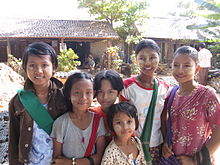Thanaka

Thanakha (Burmese: သနပ်ခါး; MLCTS: sa.nap hka:; pronounced [θənəkʰá]) is a paste made from ground bark. It is a distinctive feature of the culture of Myanmar, commonly applied to the face and sometimes the arms of women and girls, and is used to a lesser extent also by men and boys.[1][2][3]
History
Thanakha has been used by Burmese people since the mid-11th century. In a Bagan pagoda, there is a Bagan era wall painting of a Bagan woman wearing thanakha. The earliest literary reference to thanakha is in a 14th-century poem written by King Razadarit's Mon-speaking consort.[4] Mentions of thanakha also exist in the 15th-century literary works of Burmese monk-poet Shin Raṭṭhasāra (1486–1529).[4] A 16th-century kyauk pyin of Yaza Datu Kalaya, the eldest daughter of King Bayinnaung was found at Shwemawdaw Pagoda.[4]
Source and preparation


The wood of several trees may be used to produce thanakha cream; these trees grow abundantly in central Myanmar. They include principally Murraya spp. (thanakha)[2] but also Limonia acidissima (theethee or wood apple).[5] The two most popular are Shwebo thanakha from Sagaing Region and Shinmadaung thanakha from Magway Region. A more recent contender sold as a paste is Taunggyi Maukme thanakha from southern Shan State. Thanakha trees are perennials, and a tree must be at least 35 years old before it is considered mature enough to yield good-quality cuttings. Thanakha in its natural state is sold as small logs individually or in bundles, but nowadays also available as a paste or in powder form.
Thanakha cream is made by grinding the bark, wood, or roots[2] of a thanakha tree with a small amount of water[5] on a circular slate slab called kyauk pyin,[6] which has a channel around the rim for the water to drain into.
Application, style and properties
Thanakha cream has been used by Burmese men, women, and children (especially women as make-up) for over 2,000 years.[6] It has a fragrant scent somewhat similar to sandalwood.[2][7] The creamy paste is applied to the face in attractive designs, the most common form being a circular patch on each cheek, nose, sometimes made stripey with the fingers known as thanakha bè gya, or patterned in the shape of a leaf, often also highlighting the bridge of the nose with it at the same time.[6] It may be applied from head to toe (thanakha chi zoun gaung zoun).
Apart from cosmetic beauty, thanakha also gives a cooling sensation and provides protection from sunburn.[1] It is believed to help remove acne and promote smooth skin.[6] It is also an anti-fungal.[2] Marmesin has been proposed to be the principal UV blocking agent.[8] A study was conducted in 2010 by the Chulalongkorn University in Bangkok and the University of London. Thanakha bark is antioxidant, anti-inflammatory and absorbs UV rays. The research additionally revealed that thanakha inhibits tyrosinase, the enzyme that triggers melanin synthesis and impacts pores and skin discolouration–therefore, even skin tone.[9]
-
Market stall keeper wearing thanaka, Mandalay
-
Market children with thanaka, Mandalay
-
Thanaka seller at Kaunghmudaw Pagoda, Sagaing
-
A Karen child with thanaka on her face
-
A Burmese Hindu woman wearing thanaka
-
A girl wearing thanaka in Yangon
See also
Notes
- ^ a b Streissguth, Thomas (2007). Myanmar in Pictures. Twenty-First Century. pp. 44, 73. ISBN 978-0-8225-7146-9. Retrieved 2008-01-21.
- ^ a b c d e Mabberley, D J (1997). The Plant-Book: A Portable Dictionary of the Vascular Plants. Cambridge University Press. pp. 470. ISBN 0-521-41421-0. Retrieved 2008-01-21.
- ^ Kemp, Charles & Lance Andrew Rasbridge (2004). Refugee and Immigrant Health: A Handbook for Health Professionals. Cambridge University Press. p. 98. ISBN 0-521-53560-3. Retrieved 2008-01-21.
- ^ a b c Yeni (5 August 2011). "Beauty That's More Than Skin Deep". The Irrawaddy. Archived from the original on 6 August 2011. Retrieved 7 August 2011.
- ^ a b Köllner, Helmut & Axel Bruns (1998). Myanmar (Burma). Hunter Publishing. p. 18. ISBN 3-88618-415-3. Retrieved 2008-01-21.
- ^ a b c d Moe, J. "Thanakha withstands the tests of time". Mizzima News, 17 September 2008. Archived from the original on 20 September 2008. Retrieved 2008-12-06.
- ^ Baker, William & Ira Bruce Nadel (2004). Redefining the Modern. Fairleigh Dickinson University Press. p. 24. ISBN 0-8386-4013-3. Retrieved 2008-01-21.
- ^ Joo, Se-Hwan; Lee, Sang-Cheol; Kim, Seong-Ki (June 2004). "UV absorbent, marmesin, from the bark of Thanakha, Hesperethusa crenulata L.". Journal of Plant Biology. 47 (2): 163–165. doi:10.1007/BF03030648.
- ^ Wangthong, Sakulna; Palaga, Tanapat; Rengpipat, Sirirat; Wanichwecharungruang, Supason P.; Chanchaisak, Panpilai; Heinrich, Michael (November 2010). "Biological activities and safety of Thanaka (Hesperethusa crenulata) stem bark". Journal of Ethnopharmacology. 132 (2): 466–472. doi:10.1016/j.jep.2010.08.046. PMID 20804839.






